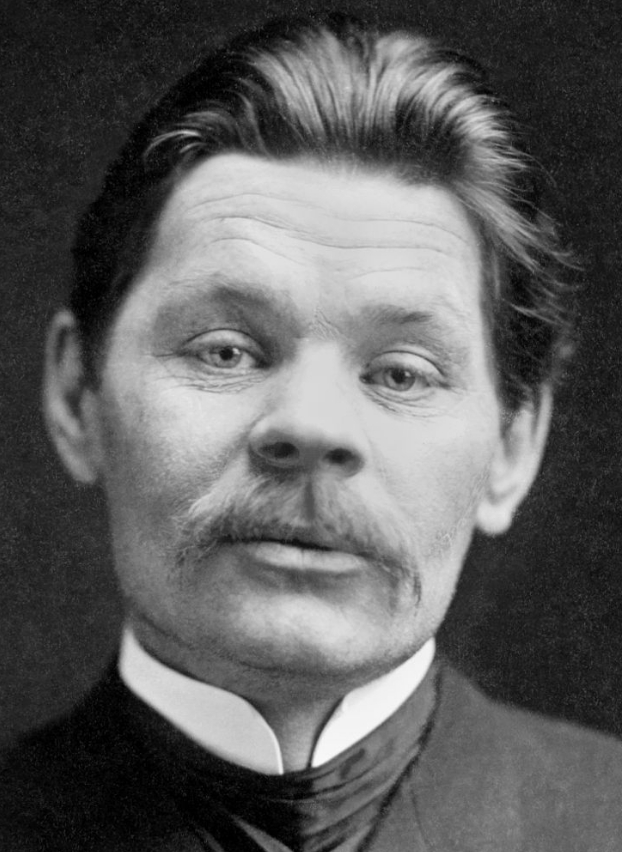On this date in 1868, Maxim Gorky, né Alexei Maximovitch Peshkov, was born in Nizhny Novgorod, Russia. After his father died when he was 5, he was sent to live with his maternal grandparents. His grandfather made him quit school at age 8 to go to work. At 12 he ran away and endured so many bitter hardships trying to survive that he later adopted the name “Gorky,” which means “The Bitter One.”
After trying unsuccessfully at age 21 to commit suicide by shooting himself, he suffered from lifelong bouts of tuberculosis as the result of damage to his lungs. Gorky undertook a two-year walking journey as a “tramp,” becoming familiar with Russia’s oppressed underclass. At 24 he became a reporter and began writing sympathetically about the outcasts, derelicts, petty criminals and prostitutes he had encountered, thus becoming a folk hero. His first collection of short stories was published to great acclaim in 1898.
Anton Chekhov befriended Gorky, introducing him to theatrical producers, who invited him to write his first plays. “The Smug Citizen” (1902), created an uproar, although “The Lower Depths” (1902) has endured. He was invited by a host of writers and dignitaries to speak in the U.S. in 1906, where the New York World newspaper pilloried him for traveling with the actress Maria Andreyeva, his common-law wife. Gorky had been amicably separated from his first wife for years but his Finnish divorce wasn’t recoginzed by the Russian Orthodox Church. Many sponsors withdrew their support, although some, such as H.G. Wells, stood by him.
He was married to Yekaterina Peshkova from 1896 to 1903 and to Andreyeva from 1903 to 1919. He had three sons, Zinovy, Maxim and Yuri, and two daughters, Yekaterina and Catherine.
Gorky, sympathetic to the Marxist cause to overthrow the government, was periodically jailed and finally exiled for several years. Critical of the Bolsheviks and Lenin, he went on a self-imposed exile throughout the 1920s, until one of his harshest critics, Stalin, invited him home. Although Gorky was criticized for endorsing some of Stalin’s policies, he is credited with saving the lives of several writers.
Gorky’s books and plays include Summer Folk (1903), Barbarians (1906), Enemies (1906), The Last Ones (1908), The Counterfeit Coin (1926), Yegor Bulychov (1931), and an autobiographical trilogy, My Childhood (1914), In the World (1916), and My Universities (1923).
In Maxim Gorky: A Political Biography (1999), Tova Yedlin wrote: “Gorky had long rejected all organized religions. Yet he was not a materialist, and thus he could not be satisfied with Marx’s ideas on religion. When asked to express his views about religion in a questionnaire sent by the French journal Mercure de France on April 15, 1907, Gorky replied that he was opposed to the existing religions of Moses, Christ, and Mohammed.”
The circumstances of his death in 1936 were murky. While it is possible he may finally have succumbed to tuberculosis or natural causes, he may also have been ordered killed by Stalin. (D. 1936)


